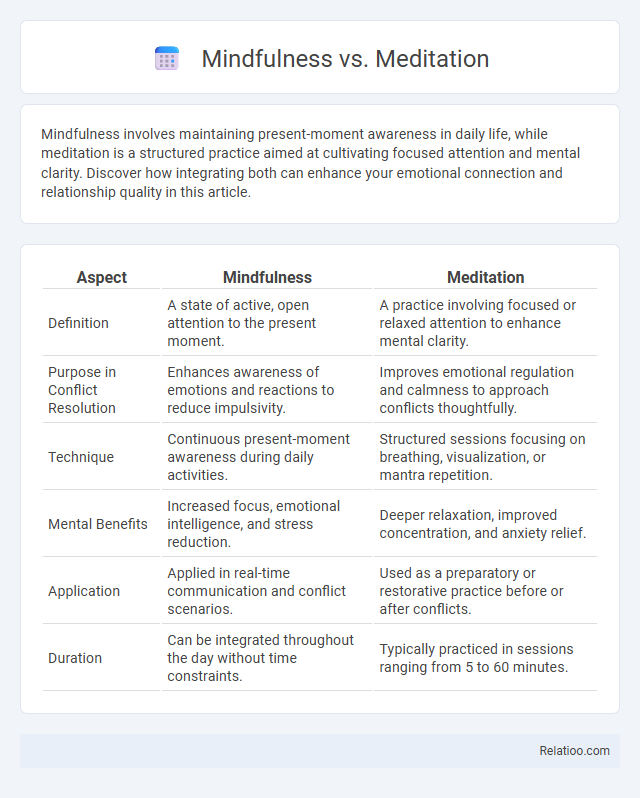Mindfulness involves maintaining present-moment awareness in daily life, while meditation is a structured practice aimed at cultivating focused attention and mental clarity. Discover how integrating both can enhance your emotional connection and relationship quality in this article.
Table of Comparison
| Aspect | Mindfulness | Meditation |
|---|---|---|
| Definition | A state of active, open attention to the present moment. | A practice involving focused or relaxed attention to enhance mental clarity. |
| Purpose in Conflict Resolution | Enhances awareness of emotions and reactions to reduce impulsivity. | Improves emotional regulation and calmness to approach conflicts thoughtfully. |
| Technique | Continuous present-moment awareness during daily activities. | Structured sessions focusing on breathing, visualization, or mantra repetition. |
| Mental Benefits | Increased focus, emotional intelligence, and stress reduction. | Deeper relaxation, improved concentration, and anxiety relief. |
| Application | Applied in real-time communication and conflict scenarios. | Used as a preparatory or restorative practice before or after conflicts. |
| Duration | Can be integrated throughout the day without time constraints. | Typically practiced in sessions ranging from 5 to 60 minutes. |
Understanding Mindfulness and Meditation
Mindfulness involves maintaining a present-focused awareness of your thoughts, emotions, and environment without judgment, while meditation is a set of formal practices designed to cultivate this awareness and enhance mental clarity. Understanding mindfulness helps you integrate these moment-to-moment attentions into daily life, whereas meditation provides structured techniques like breathing exercises or body scans to deepen this awareness. Your ability to distinguish between these concepts enhances your overall mental health and emotional well-being.
Key Differences Between Mindfulness and Meditation
Mindfulness is the practice of maintaining a moment-by-moment awareness of your thoughts, feelings, and surroundings without judgment, while meditation is a structured activity that often involves focused attention or open monitoring to cultivate a calm and clear mind. Mindfulness can be integrated into everyday activities as a continuous awareness, whereas meditation typically requires setting aside dedicated time to engage in specific techniques such as breathing exercises or guided imagery. Understanding these key differences helps you choose the practice that best supports your mental clarity and emotional well-being.
Historical Origins and Background
Mindfulness originated from ancient Buddhist practices emphasizing awareness and presence, while meditation has broader roots across various spiritual and religious traditions, including Hinduism and Taoism, serving as a technique for mental and spiritual development. Mindfulness, as a secular practice, evolved in the late 20th century through programs like Mindfulness-Based Stress Reduction (MBSR), integrating traditional mindfulness with modern psychological strategies. Your understanding of these historical backgrounds highlights how mindfulness focuses on present-moment awareness, meditation encompasses diverse mental exercises, and mindfulness practices are often embedded within meditation techniques.
Core Practices and Techniques
Mindfulness centers on moment-to-moment awareness, cultivating non-judgmental observation of thoughts and sensations through techniques like body scans and mindful breathing. Meditation involves structured practices such as focused attention, transcendental repetition, or guided visualization to train the mind for enhanced concentration and relaxation. Your consistent engagement with these core techniques improves emotional regulation, stress reduction, and cognitive clarity across both mindfulness and meditation disciplines.
Benefits of Mindfulness
Mindfulness enhances your awareness by cultivating a non-judgmental focus on the present moment, reducing stress and improving emotional regulation. Unlike meditation, which is a formal practice aimed at mental clarity, mindfulness extends throughout daily activities, promoting better concentration and overall well-being. Practicing mindfulness consistently can lead to lower anxiety levels, improved cognitive function, and greater resilience in handling life's challenges.
Benefits of Meditation
Meditation offers significant benefits such as reducing stress, enhancing emotional health, and improving concentration, which differ from general mindfulness practices that emphasize present-moment awareness. Mindfulness involves being consciously aware of your thoughts and feelings without judgment, while meditation provides structured techniques to deepen relaxation and mental clarity. By incorporating meditation into your routine, you can cultivate greater psychological resilience and promote overall well-being.
When to Use Mindfulness vs Meditation
Mindfulness practice is best used during daily activities to cultivate present-moment awareness and reduce stress continuously, while meditation is ideal for dedicated time blocks focused on deep relaxation and mental clarity. Mindfulness improves real-time emotional regulation and attention during routine tasks, whereas meditation enhances long-term cognitive function and emotional resilience through consistent sessions. Choosing between mindfulness and meditation depends on whether immediate situational awareness or structured mental training is the goal.
Common Misconceptions
Mindfulness is often mistaken for meditation, but mindfulness refers to a mental state of present-moment awareness, while meditation is a practice that cultivates this state through focused attention or open monitoring. Many believe mindfulness requires sitting still, yet it can be integrated into daily activities like walking or eating, enhancing Your overall well-being. Misconceptions also arise from assuming meditation must be long or complex; short, consistent sessions can effectively foster mindfulness and reduce stress.
Integrating Both Practices into Daily Life
Mindfulness and meditation both enhance mental clarity and emotional balance, with mindfulness focusing on present-moment awareness during everyday activities, while meditation involves dedicated practice sessions aimed at deep concentration or relaxation. Integrating mindfulness and meditation into your daily routine can improve stress management, increase focus, and promote overall well-being by encouraging consistent awareness and intentional pause. Establish small habits such as mindful breathing during breaks and brief meditation sessions to seamlessly blend both practices into your lifestyle for sustained benefits.
Choosing the Right Practice for You
Mindfulness involves maintaining present-moment awareness and accepting experiences without judgment, while meditation is a structured practice to cultivate focused attention and mental clarity. Choosing the right practice for you depends on your goals, whether reducing stress, enhancing concentration, or developing emotional resilience. Integrating mindfulness into daily life or engaging in regular meditation sessions can both effectively support mental well-being based on your personal preferences and lifestyle.

Infographic: Mindfulness vs Meditation
 relatioo.com
relatioo.com